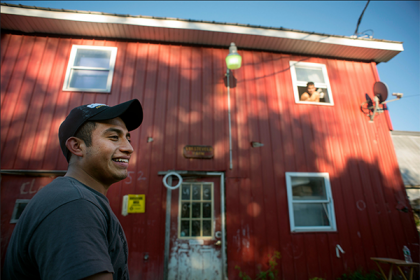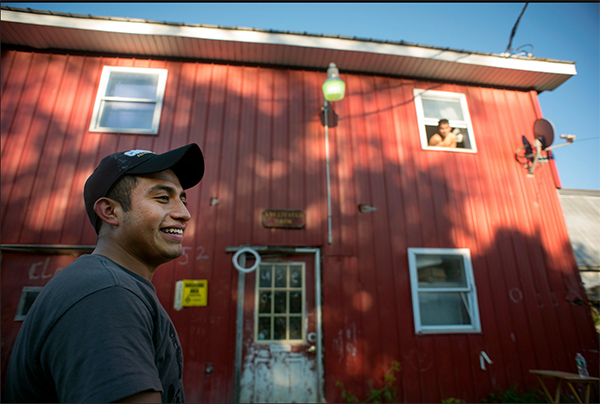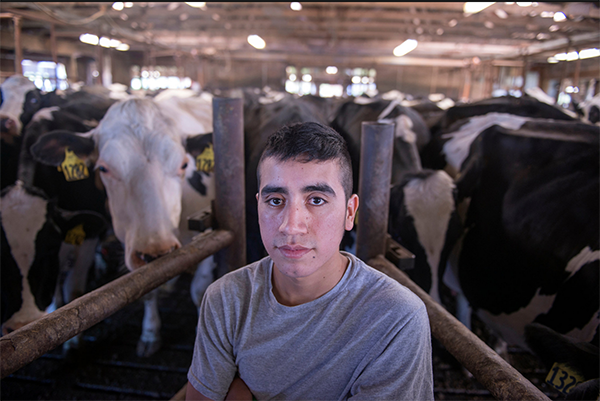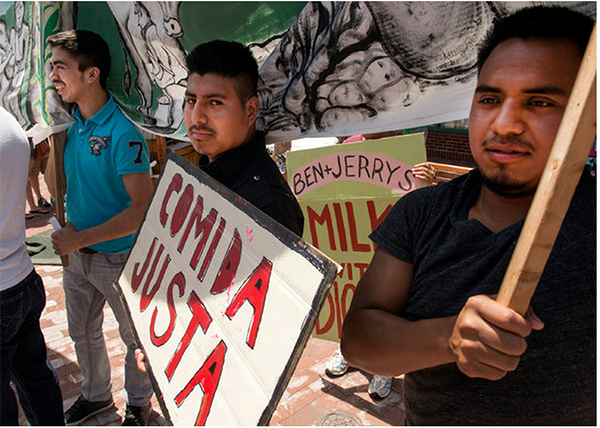
This post originally appeared on the Coalition of Immokalee Workers’ blog July 6, 2015.
“Success” of “innovative movements” by workers from Vermont to Florida earns spread in U.S.’s most-read newspaper…
Just in time for the Fourth of July weekend, the movement for Worker-driven Social Responsibility (WSR) rocketed into the national spotlight thanks to a great new article on the front page of last Friday’s New York Times business section! The feature-length piece from longtime labor columnist Steven Greenhouse, entitled “Farm Labor Groups Make Progress on Wages and Working Conditions,” highlighted the efforts of Vermont dairy workers to win, in the words of farmworker Arnulfo Ramirez, the right to be “treated with basic respect,” through their nascent Milk with Dignity Program and potential partnership with ice cream icon Ben & Jerry’s . ![]()
The article also updates readers on the expansion of the CIW’s Fair Food Program, as well as the increasing visibility of the CIW’s groundbreaking social accountability program at the retail level due to the growing deployment of the Fair Food logo (right) at point of sale displays in Whole Foods and Walmart stores.
The Times’ article constitutes an extraordinary milestone for the budding Milk with Dignity Program, which includes all of the essential elements of the Worker-driven Social Responsibility model. Those elements — ranging from a worker-authored code of conduct to market consequence for suppliers who fail to comply with the program’s human rights standards — ensure worker participation in defining and monitoring their own rights and meaningful enforcement of the standards through binding agreements with major retail purchasers.
You can find the New York Times article in its entirety here, but for now we will leave you with an extended excerpt from Friday’s piece, below, and a reminder to check back soon for all the news fit to print from the ever-expanding fight for Fair Food:
Farm Labor Groups Make Progress on Wages and Working Conditions
BURLINGTON, Vt. — It was an unlikely place for a labor protest: 120 migrant workers, students and clergy members were shouting outside the flagship store of Ben & Jerry’s, which displayed a “Peace, Love and Ice Cream” sign on its facade.
They were demanding that Ben & Jerry’s — which prides itself on its progressive reputation — require the Vermont dairy farms that supply its milk and cream to follow a code of conduct that would guarantee their migrant workers a weekly day off, seven vacation days a year and more, including improved housing.
“The majority of us farmworkers, we don’t even have a day off,” Arnulfo Ramirez, a dairy worker from Guatemala, told the crowd last month. “We’re looking for Ben & Jerry’s to help make sure we’re treated with basic respect.”
With many farmworkers frustrated by low pay and substandard housing — and as more consumers are insisting on food that is produced ethically — innovative movements are sprouting across the country to improve wages and working conditions for America’s more than two million farmworkers.
And for all the obstacles they face — including the decline of the United Farm Workers union founded by Cesar Chavez, and the fact that large numbers of farmworkers are living in the United States without legal authorization — these movements are starting to have some success.
Migrant Justice, the group behind the Ben & Jerry’s protest, began organizing Vermont’s 1,500 migrant dairy workers in 2009 after one worker was dragged into dairy machinery and strangled by his own clothing. The group is counting on Ben & Jerry’s support to help persuade other ice cream, yogurt and milk companies to adopt its “Milk With Dignity” goals.
“We feel that Ben & Jerry’s is the right place to start,” said Brendan O’Neill, an organizer with Migrant Justice. “They have fair-trade coffee. They have cage-free eggs. We think they can do more for dairy workers, too.” […]
[…] And in Florida, the Coalition of Immokalee Workers has persuaded McDonald’s, Walmart, Burger King, Whole Foods and other companies to require their tomato growers to improve pay and conditions for 30,000 workers. Its Fair Food Program has an elaborate enforcement apparatus, overseen by a retired New York judge, that has greatly reduced abuses like bullying and sexual harassment by crew leaders.
“We’re seeing a bunch of different models to help farmworkers,” said Philip Martin, an agricultural economist at the University of California, Davis. “The question is, Are they scalable?”
Perhaps so. Greg Asbed, co-founder of the Immokalee group, said its program was being extended to 10,000 more workers, starting at Florida bell pepper farms.
And Walmart — to the applause of labor advocates — has taken the lead in expanding the Fair Food Program beyond Florida, requiring tomato suppliers in Georgia, South Carolina and Virginia to comply.
“This is a progressive program that can do a lot of good,” said Marilee McInnis, a Walmart spokeswoman. “This program helps reach the goal we are all trying to reach, which is improved treatment of workers in the produce industry.”
Whole Foods has begun placing a “Fair Food” logo on many Florida tomatoes in its stores; Walmart will soon do the same. […]
[…] Here in Vermont, Migrant Justice has been pressing Ben & Jerry’s since December, asking the company not just to enforce a conduct code, but also to offer its farmers a premium for meeting higher standards, which would enable them to pay their workers more.
On June 19, the day before the protests in Burlington and 16 other cities, Ben & Jerry’s signed an agreement with Migrant Justice, pledging to develop an overall, detailed code of conduct. (The protests proceeded, organizers said, to keep the heat on Ben & Jerry’s.)
“Our whole mission and value system, it’s to ensure people in our supply chain have a dignified life,” said Rob Michalak, Ben & Jerry’s global director of social mission. He said the company had already incorporated some Milk With Dignity standards into its own program.
“With the dairy supply chain, you might always have outlier farmers that have issues,” Mr. Michalak said. “If you have one substandard farm, that’s one too many.”
Mr. Ramirez, the Guatemalan dairy worker, turned to Migrant Justice in part because he felt trapped on a farm just south of the Canadian border, where he oversees the milking of 240 cows during his shift. He became an enthusiastic member after being invited to a Saturday assembly with lunch, a soccer game and a wide-ranging discussion about dairy workers’ problems. He was able to go only because the group provided a college student to drive him there.
After working four-and-a-half years, Mr. Ramirez said, he earns just $9 an hour, less than Vermont’s $9.15 minimum wage. (Farmworkers are not covered by federal and most states’ wage laws.)
“I like the work, but it’s not a just environment,” said Mr. Ramirez, who works nearly 70 hours a week. “I’ve had just six days off in my four-and-a-half years here, and that’s usually because I had to go to the Guatemalan Consulate. I would love to have a regular day off once in a while.”
Mr. Ramirez, 23, lives in an apartment inside the barn filled with the smell of cows. […]
[…] Migrant Justice, Ben & Jerry’s and the farmers still have many issues to thrash out. On farms with only two or three migrant workers, for example, it might not be so easy to give workers one day off each week because cows need to be milked three times a day.
But Victor Diaz, a dairy laborer from Mexico who works 12 hours a day, seven days a week, expressed optimism that things would soon get better.
“Ben & Jerry’s is feeling the pressure from many people,” he said. “If it wasn’t feeling all that pressure, everything would just remain the same.”








